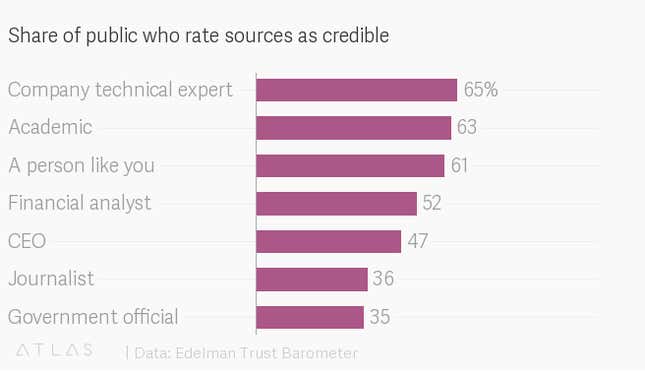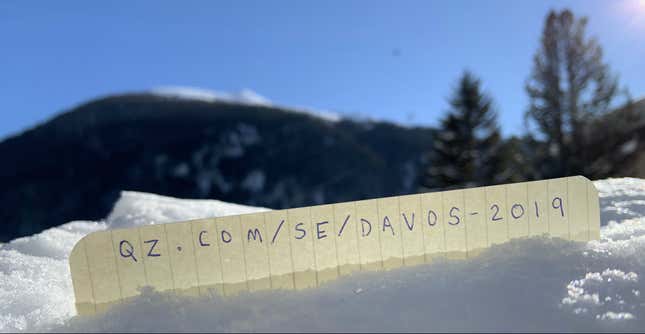Good morning, delegates!
This is the end. Thanks for allowing us—Jason, Eshe, Heather, and Kevin—to be part of your inbox during the forum. It has been a pleasure.
There’s a half day of programming today, so we’re not done discussing Globalization 4.0 just yet. Also, purely for reference, it will be mostly sunny and just about every ski lift is open.
Our parting thoughts on the big themes of this year’s forum will hit your inboxes tomorrow, as part of the regular version of the Quartz Daily Brief.
What to watch for today
Friday is for monetary policy. At 11:30am in the Congress Hall, a panel on the global economy features the heads of the IMF, World Bank, and central banks of Japan and South Africa.
A global data deal that cuts out the world’s most populous country. On the sidelines of the forum, nearly 70 countries are expected to unveil an agreement to revive long-stalled WTO negotiations on the trade-related aspects of e-commerce. China will reportedly not be among them, another sign of the digital cold war brewing with the West, which is pushing for a deal to govern international data flows.
Crypto never sleeps. It’s only day two of the three-day Blockchain Economic Forum, run by crypto exchange Latoken at the Arabella Hotel Waldhuus. At 2:30pm, Nouriel “Dr. Doom” Roubini will discuss central bank digital currencies, probably not very favorably. If you’re still around on Saturday night—just can’t get enough Davos, eh?—there is a closing reception at the Hard Rock Hotel.
Clean-living Davos. The best thing you can do for your health at this point is probably just sleep in. If that’s not your thing, there’s the morning meditation at 8:15am in the Congress Centre or a half-day session up the Rinerhorn mountain (vans leave from 8:30am at the Shuttle Hub) to “discover what science-based activities can sharpen one’s sense of purpose and meaning, essential pillars to cultivating happiness.”
Party planner. Really? Still? The official program ends with a farewell lunch at 1pm up the Schatzalp. After that, a smattering of generally low-key dinners—aside from the rowdy fondue feast put on by the WEF for the weary media hordes—take place around town. And there’s always the Piano Bar, but do you think that’s wise at this stage?
Who won day three?
Greta Thunberg, the Swedish teenager and climate-change activist who called the world to attention at COP24, brought her stark message to Davos, and more specifically the dome where Salesforce hosted lunch. The guests heard a panel featuring Jane Goodall, Bono, and Paris accords convener Christiana Figueres. But it was Thunberg who got the last word. She called companies and governments—that is, Davos delegates—to account for not doing more to stop our unfolding environmental catastrophe.
“We are facing [an] existential crisis, the biggest crisis humanity has ever faced,” the 16-year-old said. “If everyone is guilty, then no one is to blame, and someone is to blame… I think many of you here today belong to that group of people.” A hush came over the room.
Lunch attendee Deb Dugan, CEO of the Bono co-founded (RED) AIDS organization, called Thunberg “perhaps the most enlightened and wise person in the room. She moved me to tears because all I could think was, ‘What have we done?’”
More highlights from yesterday
Red alert. Citing “the mortal danger facing open societies from the instruments of control that machine learning and artificial intelligence can put in the hands of repressive regimes,” George Soros focused his annual dinner speech on fears about Xi Jinping’s China. As he delivered the speech, his press office sent reporters two transcripts—one in English and one in Chinese.
A lesson from space. Earthly politics seem to be chronically in crisis but there’s one place international cooperation has prevailed for decades: space. Sarah Al Amiri, the UAE’s science minister, said space is a testing ground for a better way of doing politics, in a panel moderated by Quartz’s Kevin Delaney. That said, the legal system that spells what countries can and cannot do in space is ambiguous.
Profiles encouraged. LinkedIn’s Jia Hyun had a clever (and marketing-savvy) way to introduce the panelists at an FQ Lounge session on corporate activism, asking them: What’s one thing about you that’s not on your LinkedIn profile? Among the things we learned: Suzanne Kounkel, Deloitte Consulting’s US chief marketing officer, played on the boys’ basketball team in fifth grade; Jacquelline Fuller, head of Google.org, spent three years as a stay-at-home mom; and Cindy Robbins, Salesforce’s president and chief people officer, is an introvert. (“This must be a tough week for you,” Fuller noted.)
It’s alright to cry. Bloomberg chairman Peter Grauer and former Unilever CEO Paul Polman both choked up during a panel on companies’ disability inclusion policies, as they told touching anecdotes about personal experiences, with the latter exec’s story moving Accenture North America CEO Julie Sweet to tears, too. The session, which is very much worth watching, was moderated by Caroline Casey, the legally blind founder of the advocacy group Binc. In the moment, it felt like a turning point in how disability gets discussed by global business leaders in Davos and beyond.
Brexit laid bare. As the chances of a disorderly Brexit rise, the chat about the UK’s divorce from the EU generated both bemusement and horror among delegates. At a lunch, UK chancellor Philip Hammond said he was against a second Brexit referendum because it would break trust in the political system, which is not exactly a paragon of probity these days. Meanwhile, Bank of England governor Mark Carney said companies weren’t prepared for a no-deal Brexit, which bookies give a 15% chance of happening.
Every little thing he does is magic. Sting played a soulful set at the Salesforce party with an audience that included Uber’s Dara Khosrowshahi, Google’s Ruth Porat, Marc Benioff, and will.i.am. “Economics doesn’t work without nature. Economics doesn’t work without community,” Sting said at the end. He then played, “Fragile.”
Chart interlude
Journalists are only the second-least trusted people by the public, according to Edelman’s big survey released during the forum every year. Could be worse!

Seen and heard, bumper last-day-of-Davos edition
“There are no experts for the future. Only experts for yesterday.”—Jack Ma, Alibaba co-founder
This is the font of the global elite? We did a double-take when spying a delegate in the Congress Centre typing a memo in Comic Sans.
“We might be inhaling our own exhaust here…”—preamble by a self-aware exec who nonetheless went ahead and made the point anyway
The cuddliest-delegate-of-the-week award goes to Ikkoy, the pint-sized Pomeranian that Gerardo from Paybook totes around in a backpack to events around the world, including the World Economic Forum.
“Young people don’t care about privacy… until they get hacked.”—European bank exec
“Would you name your kid Maxima? What kind of name is that?”—someone in the Congress Hall isn’t impressed by the Queen of the Netherlands
Sketches of crypto, a one-act play
The scene: Dudes mulling around one of the many blockchain lounges along the Promenade
Bro 1: So you used to be in crypto mining?
Bro 2: Yeah.
Bro 1: Ouch.
Bro 2: Yeah.
“Climate change is the defining issue of our time. We are losing the race.”—António Guterres, UN secretary general
News from around the world
Two bills to reopen the US government died in the Senate. A Republican measure to allocate $5.7 billion for Donald Trump’s proposed border wall and a Democrat measure to re-open the government without wall funding both failed to reach the 60-vote threshold needed to pass. About 800,000 federal workers are not being paid as a result of the shutdown.
Venezuela’s opposition challenger spoke. Juan Guaidó hasn’t been seen in public since he declared himself interim president of the country on Wednesday, but in an interview with Spanish-language broadcaster Univision, the head of the national assembly—whose location was kept secret—said he would be willing to grant amnesty to president Nicolás Maduro if he helped restore democracy.
George Soros launched a blistering attack against China at Davos. Speaking at his annual dinner during the World Economic Forum, the philanthropist said he wanted to “call attention to the mortal danger facing open societies from the instruments of control that machine learning and artificial intelligence can put in the hands of repressive regimes,” referring specifically to China’s social credit system.
Matters of debate
Join the conversation with the new Quartz app!
America needs a wealth tax. Presidential hopefuls are campaigning on the idea of making millionaires and billionaires pay their fair share.
Earth’s dysfunctional politics shouldn’t extend to space. Davos attendees worry that international conflicts could become a major hurdle in orbit and beyond.
Journalists should never tweet. Twitter is the world’s most damaging social network for reporters and editors alike.
Surprising discoveries
The White House is photoshopping Donald Trump. Not-so-subtle alterations are slimming the president’s bulk and lengthening his fingers.
A board game based on the Novichok nerve-agent attack is on sale in Russia. The makers of “Our Guys in Salisbury” said the game was a response to biased coverage of Russia in Western media.
A German man is suing over women-only parking spots. The Bavarian town of Eichstätt designated well-lit and accessible spaces for women after a sexual assault.
Our best wishes for an inspiring final day at the forum and a safe trip home. If you need reading material for the journey, click here to read our coverage from Davos this week.
